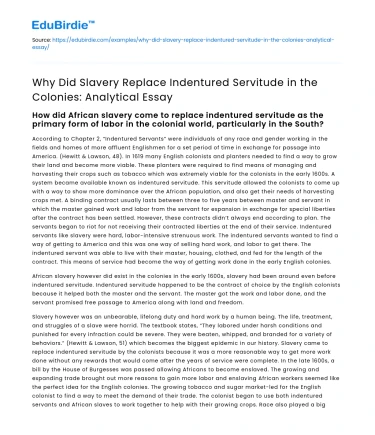How did African slavery come to replace indentured servitude as the primary form of labor in the colonial world, particularly in the South?
According to Chapter 2, “Indentured Servants” were individuals of any race and gender working in the fields and homes of more affluent Englishmen for a set period of time in exchange for passage into America. (Hewitt & Lawson, 48). In 1619 many English colonists and planters needed to find a way to grow their land and become more viable. These planters were required to find means of managing and harvesting their crops such as tobacco which was extremely viable for the colonists in the early 1600s. A system became available known as indentured servitude. This servitude allowed the colonists to come up with a way to show more dominance over the African population, and also get their needs of harvesting crops met. A binding contract usually lasts between three to five years between master and servant in which the master gained work and labor from the servant for expansion in exchange for special liberties after the contract has been settled. However, these contracts didn’t always end according to plan. The servants began to riot for not receiving their contracted liberties at the end of their service. Indentured servants like slavery were hard, labor-intensive strenuous work. The indentured servants wanted to find a way of getting to America and this was one way of selling hard work, and labor to get there. The indentured servant was able to live with their master, housing, clothed, and fed for the length of the contract. This means of service had become the way of getting work done in the early English colonies.
African slavery however did exist in the colonies in the early 1600s, slavery had been around even before indentured servitude. Indentured servitude happened to be the contract of choice by the English colonists because it helped both the master and the servant. The master got the work and labor done, and the servant promised free passage to America along with land and freedom.
Save your time!
We can take care of your essay
- Proper editing and formatting
- Free revision, title page, and bibliography
- Flexible prices and money-back guarantee
Slavery however was an unbearable, lifelong duty and hard work by a human being. The life, treatment, and struggles of a slave were horrid. The textbook states, “They labored under harsh conditions and punished for every infraction could be severe. They were beaten, whipped, and branded for a variety of behaviors.” (Hewitt & Lawson, 51) which becomes the biggest epidemic in our history. Slavery came to replace indentured servitude by the colonists because it was a more reasonable way to get more work done without any rewards that would come after the years of service were complete. In the late 1600s, a bill by the House of Burgesses was passed allowing Africans to become enslaved. The growing and expanding trade brought out more reasons to gain more labor and enslaving African workers seemed like the perfect idea for the English colonies. The growing tobacco and sugar market-led for the English colonist to find a way to meet the demand of their trade. The colonist began to use both indentured servants and African slaves to work together to help with their growing crops. Race also played a big role in the change between indentured servants and slaves. The indentured servant could be any race or gender, but most slaves were African-born people men, women, and children some were born into slavery and kidnapped from their homeland to do a life of service and hard labor. The textbook states, “In 1662 defined slavery as an inherited status passed on from mothers to children. The slow march toward racial slavery had begun” (Hewitt & Lawson, 50). This movement and the harsh conditions under which these slaves worked began to become too much for some which in turn led to numerous rebellions over the course of our history.
Hewitt, Nancy. A. and Lawson, F. Steven. “Exploring American Histories”. Volume I, A Survey with Sources. 2nd Edition. Bedford/St. Martin’s. 2017
Did you like this example?
Make sure you submit a unique essay
Our writers will provide you with an essay sample written from scratch: any topic, any deadline, any instructions.
Cite this paper
-
APA
-
MLA
-
Harvard
-
Vancouver
Why Slavery Replaced Indentured Servitude in Colonies.
(2023, August 29). Edubirdie. Retrieved December 22, 2024, from https://edubirdie.com/examples/why-did-slavery-replace-indentured-servitude-in-the-colonies-analytical-essay/
“Why Slavery Replaced Indentured Servitude in Colonies.” Edubirdie, 29 Aug. 2023, edubirdie.com/examples/why-did-slavery-replace-indentured-servitude-in-the-colonies-analytical-essay/
Why Slavery Replaced Indentured Servitude in Colonies. [online].
Available at: <https://edubirdie.com/examples/why-did-slavery-replace-indentured-servitude-in-the-colonies-analytical-essay/> [Accessed 22 Dec. 2024].
Why Slavery Replaced Indentured Servitude in Colonies [Internet]. Edubirdie.
2023 Aug 29 [cited 2024 Dec 22].
Available from: https://edubirdie.com/examples/why-did-slavery-replace-indentured-servitude-in-the-colonies-analytical-essay/
copy






 Stuck on your essay?
Stuck on your essay?

